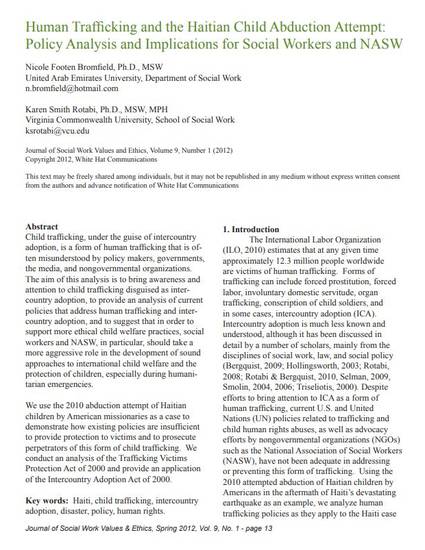
Article
Human Trafficking and the Haitian Child Abduction Attempt: Policy Analysis and Implications for Social Workers and NASW
Journal of Social Work Values and Ethics
(2012)
Abstract
Child trafficking, under the guise of intercountry adoption, is a form of human trafficking that is often misunderstood by policy makers, governments, the media, and nongovernmental organizations. The aim of this analysis is to bring awareness and attention to child trafficking disguised as intercountry adoption, to provide an analysis of current policies that address human trafficking and intercountry adoption, and to suggest that in order to support more ethical child welfare practices, social workers and NASW, in particular, should take a more aggressive role in the development of sound approaches to international child welfare and the protection of children, especially during humanitarian emergencies.
We use the 2010 abduction attempt of Haitian children by American missionaries as a case to demonstrate how existing policies are insufficient to provide protection to victims and to prosecute perpetrators of this form of child trafficking. We conduct an analysis of the Trafficking Victims Protection Act of 2000 and provide an application of the Intercountry Adoption Act of 2000.
Keywords
- Haiti,
- child trafficking,
- intercountry adoption,
- disaster,
- policy,
- human rights
Disciplines
Publication Date
Spring 2012
Citation Information
Nicole Footen Bromfield and Karen Smith Rotabi. "Human Trafficking and the Haitian Child Abduction Attempt: Policy Analysis and Implications for Social Workers and NASW" Journal of Social Work Values and Ethics Vol. 9 Iss. 1 (2012) p. 13 - 25 Available at: http://works.bepress.com/karen-rotabi/39/
